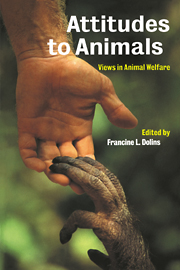Book contents
- Frontmatter
- Contents
- List of contributors
- Acknowledgements
- Part I Attitudes to animals
- 1 A look back in the mirror: perspectives on animals and ethics
- 2 Me and my totem: cross-cultural attitudes towards animals
- 3 Sheep in wolves' clothing? Attitudes to animals among farmers and scientists
- Part II Animal awareness
- Part III Animal welfare
- Part IV Research and education
- Part V Epilogue: the future of wild animals
- Index
3 - Sheep in wolves' clothing? Attitudes to animals among farmers and scientists
Published online by Cambridge University Press: 16 November 2009
- Frontmatter
- Contents
- List of contributors
- Acknowledgements
- Part I Attitudes to animals
- 1 A look back in the mirror: perspectives on animals and ethics
- 2 Me and my totem: cross-cultural attitudes towards animals
- 3 Sheep in wolves' clothing? Attitudes to animals among farmers and scientists
- Part II Animal awareness
- Part III Animal welfare
- Part IV Research and education
- Part V Epilogue: the future of wild animals
- Index
Summary
Introduction and methods
Within the last 30 years, western attitudes to non-human animals and their treatment have undergone some revolutionary changes (see Midgley, 1994; and also see Chapter 11, this volume). Methods of exploiting animals that used to be accepted without question are now criticized on ethical grounds by growing numbers of people, and animal-related issues which were once considered the domain of small, idealistic minorities have become the subject of widespread public and political controversy. This remarkable change in moral emphasis is obliging certain sectors of the animal-using community to re-examine and justify their attitudes and activities towards animals in the face of mounting public criticism. This chapter describes how the members of two distinct animal-using groups – livestock farmers and research scientists – are responding to this kind of pressure.
In popular humane and animal rights literature, animal ‘exploiters’ are commonly portrayed as being simply callous or cruel. Such simplistic characterizations tend to reinforce feelings of dislike and distrust, while at the same time discouraging constructive dialogue between those on opposite sides of the debate. Indirectly, they therefore also constitute a barrier to improvements in animal welfare. The aim of the present study was to move beyond these stereotypic depictions to explore the actual attitude constructs employed by people involved in various consumptive, animalusing activities.
The material presented in this chapter was collected in situ (i.e. on farms and in laboratories) in the form of anonymous, recorded interviews with individual volunteer subjects.
- Type
- Chapter
- Information
- Attitudes to AnimalsViews in Animal Welfare, pp. 26 - 34Publisher: Cambridge University PressPrint publication year: 1999
- 7
- Cited by

